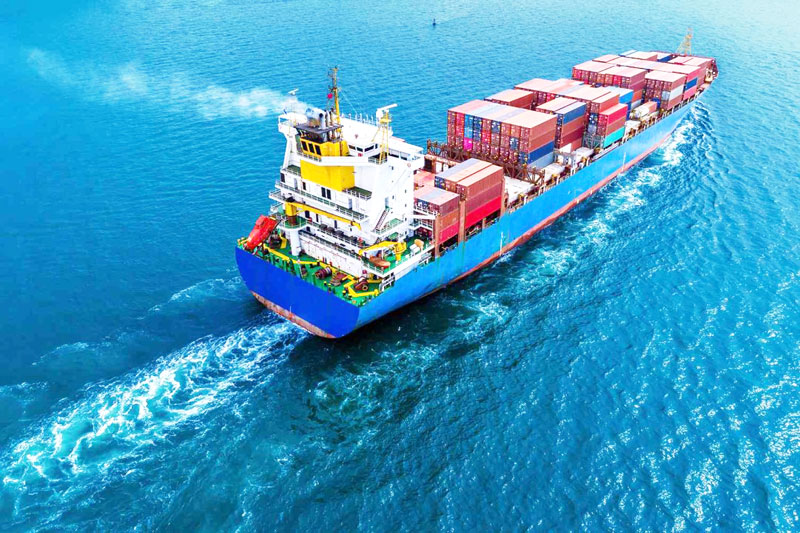Thursday Mar 05, 2026
Thursday Mar 05, 2026
Tuesday, 9 January 2024 00:10 - - {{hitsCtrl.values.hits}}

|
 Only four days into the new year, 2024, one which most Sri Lankans approached with trepidation due to the well-publicised belt-tightening that is due, the last thing they expected was to discover that their President had decided to involve them at great cost ($ 250 million a fortnight) in a possible international conflict, oceans away, which has little to do with them.
Only four days into the new year, 2024, one which most Sri Lankans approached with trepidation due to the well-publicised belt-tightening that is due, the last thing they expected was to discover that their President had decided to involve them at great cost ($ 250 million a fortnight) in a possible international conflict, oceans away, which has little to do with them.
The Daily Mirror of 4 January 2024 reports that “President Ranil Wickremesinghe said a decision has been taken to deploy a ship from the Sri Lanka Navy on the Red Sea area, contributing to the security of the region against Houthi activities.”
What exactly does “a decision has been made” imply? Did the President make this decision on his own? Or is there anyone else implicated in this decision? Did the Parliament know? Did the Cabinet know?
The President is empowered to declare war and peace, according to the Constitution. But one would assume that was directly in defence of Sri Lanka and its people. Is he also empowered to deploy our forces overseas, put us all in danger of some terrorist attack as a consequence of this decision, apart from putting members of our Navy in harm’s way for no good reason that has been explained to us with any clarity?
|
The President is empowered to declare war and peace, according to the Constitution. But one would assume that was directly in defence of Sri Lanka and its people
|
The conflict we aren’t part of
Everyone knows there’s a war going on in the Gaza strip and the Occupied West Bank. It is estimated that 22,600 Palestinians have died so far, the overwhelming number being women and children due to the bombings and raids by the Occupying power, Israel.
Houthi attacks in the Red Sea are “a bid to pressure Israel to stop its devastating war and siege on the Gaza Strip that has killed more than 21,000 Palestinians”, according to the Houthi spokesman, as reported by Aljazeera.
The Houthis are a Yemeni militia that has attacked “ships it identified as being linked to Israel that were passing through the Bab el-Mandeb strait into the Red Sea.” This is very specific targeting.
The United States deployed ships in the area in support of Israel, in what is “the first major direct military engagement between the US military and Houthi fighters.” The operation has a name: Operation Prosperity Guardian. It is reported that several partners of the United States have “distanced themselves” from this initiative. Al Jazeera reports that only the United Kingdom has “directly contributed with war ships”, leaving the United States “to act alone”. It is also reported that the operation hasn’t had much luck in deterring the Houthis, who have increased the frequency of their attacks.
The Houthis are described in the Daily Mirror report as “Iran-backed”. This complicates things further, and if it is in fact true, it requires much reflection before Sri Lanka gets involved. Iran is a major market for Sri Lankan tea. That apart, is there a possibility this would escalate into a regional conflict? Was the Foreign Ministry consulted in making the decision to deploy our Navy in such a context?
Who rattled our cage?
Where do we Sri Lankans come into it? Most of the world apparently decided to stay well away from active involvement in the Red Sea theatre. Only the UK, a rich country, decided to offer warships.
Most of the world wants to see an immediate ceasefire to the whole conflict, so the tragedy unfolding in the Middle East can be halted. At the UN General Assembly, Sri Lanka voted with the majority of the world for a ceasefire. This has been the limit of Sri Lanka’s involvement related to this conflict thus far. As with the rest of the world, people of Sri Lanka would hardly want to prolong the misery of the Palestinians and possibly others by helping to escalate it to a regional conflict. It is barely possible to watch children being scraped out of the mass of concrete as Palestine’s civilian infrastructure is razed to the ground by the almost daily bombings by the occupying power, leaving the inhabitants of those buildings either dead or looking like the un-dead, covered in grey cement dust and disoriented. It is nothing but a massive kill-zone.
South Africa has filed a case in the International Criminal Court at The Hague, submitting that one party to the war, Israel, has committed genocidal acts. The submission has been scrutinized and found to be flawless in terms of all its technicalities. Marwan Bishara, academic and senior political analyst at Al Jazeera said on TV that he had read every page of the submission and that every allegation is based on evidence that has been provided. Navi Pillai, a South African, and the chairperson of the United Nations Commission of Inquiry on the Occupied Palestinian Territory, when asked by Al Jazeera whether Israel’s bombardment in Gaza strip was “an act of self-defense”, replied, “We thought this cannot be equated with self-defense, it’s collective punishment.”
What would a Sri Lankan Navy ship, from this impoverished country unable to pay its debts, heavily dependent on the IMF, and with a population heading towards a crisis of economic survival, be doing in the Red Sea at this time, taking on the Houthis, in a conflict that is not ours, in a context where claims of genocide and collective punishment which are war crimes, are invoked? Isn’t this contrary to Sri Lanka’s own Operation Prosperity?
Is deploying its Navy the only rational response by a small island nation to possible price hikes of goods due to the re-routing of cargo ships from the area? As reported by the Daily Mirror, the President evidently thinks so. If it were so, why haven’t many more countries except the UK and India more recently--one of whose cargo ships was struck-- considered the same brilliant step? Wouldn’t adding pressure, together with the rest of the world through diplomacy, a safer, cheaper and more rational response, at this stage of Sri Lanka’s crisis-ridden circumstances?
Great timing
We’ve just come through a Christmas where Bethlehem, the birthplace of Jesus, in the Occupied West Bank was deserted, bankrupt and in collective mourning. The nativity scene in the Church of the Nativity reflected the everyday reality of the people of Gaza, with baby Jesus lying among blocks and shards of broken concrete.
We had a little taste of such a reality with the Easter Sunday attacks on our churches, only a few years ago. Who could possibly forget the blood splattered statue of Jesus Christ at St Anthony’s church? That attack by extremists happened out of nowhere, for no known reason, and attributed to a Sri Lankan group identifying with ISIS, which took responsibility, apparently after much urging by some mystery person in Sri Lanka, according to evidence gathered at an official inquiry. One would think that Sri Lanka would take every precaution to prevent such a tragedy by refraining from needless, controversial, high-profile entanglements which leave our citizens vulnerable.
2024 has been described as a year of unavoidable hardship by the government. It is also an election year, which would correct the anomaly of an unelected person being the President of the country.
With the deployment of our Navy in the Red Sea, it would also be the first time that a person unelected even to the legislature would be involving our country’s military in a theatre of conflict far from our shores, to engage in possible violence on behalf of another country with all its probable consequences for ordinary citizens of this country who are already suffering the consequences of bad decisions taken by their leaders.
Are we acting as mercenaries for another country, in order to pay our debts? If so, shouldn’t we know? In the absence of such information, the decision to deploy our military outside our borders, would be a unilateral geo-political decision by the President.
Shouldn’t such serious decisions be made after much thought and consultation, including with the Opposition parties? Or, given their silence, are they also complicit in this decision? In this election year, we would like to know.
If there is any Constitutional reform to be undertaken, it is that an interim President has to be elected from among elected members of the legislature, so that any abnormal decision such as the SLN deployment in a fraught situation in the Red Sea would be made by someone who had at least got a mandate from the people as proof of their faith in the capacity of that person to make life and death decisions on their behalf.